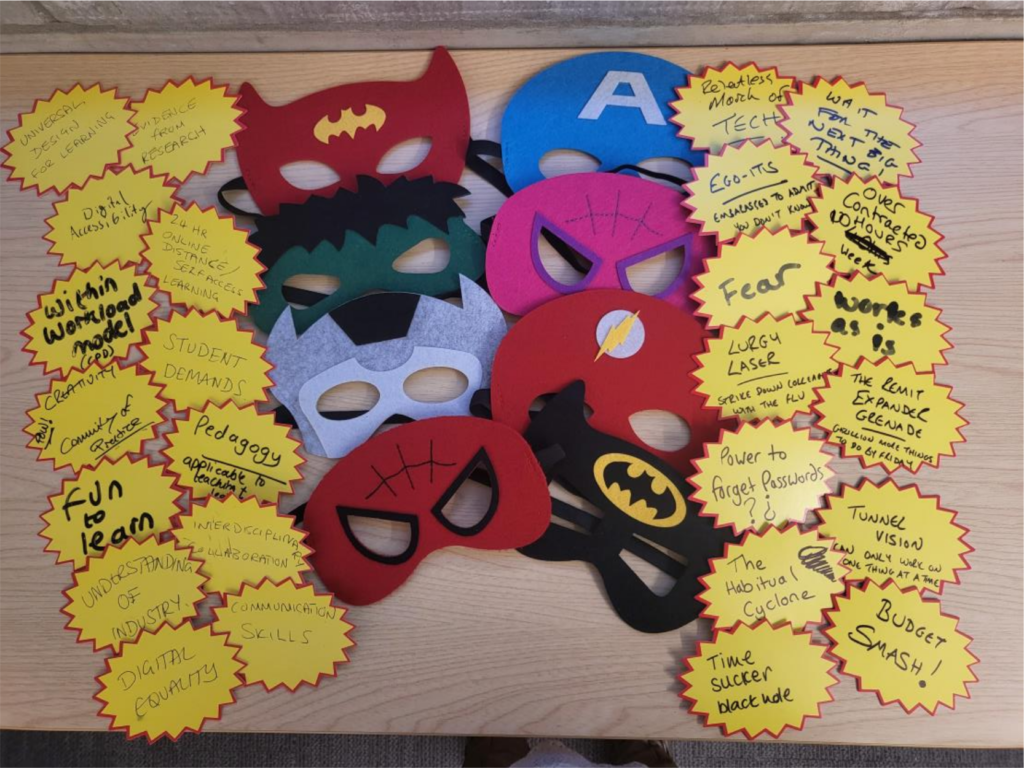by Rachael Thomas, Learning Technologist, University of Sussex

In the heart of Sussex something extraordinary is happening. A few times each term a unique assembly occurs. Learning technologists and digital team members from various educational establishments across the region gather not just to meet but to embark on a mission. Their quest? To harness technology’s full potential in supporting teaching and learning in higher education.
At a recent Christmas meetup hosted by Brighton Metropolitan College, I had the privilege of leading a discussion unlike any other. Our topic: how to elevate digital skills among academic staff. In the dynamic landscape of higher education this isn’t merely a nice-to-have. It’s the lifeline of modern academia, ensuring its vibrancy and relevance in the digital age. As online and blended learning become more prevalent, mastering digital skills is akin to wielding a compass in uncharted territories.
Mastering digital tools is akin
to wielding a compass in uncharted territories
Rather than opting for the usual panel discussion, I decided to add a twist. Imagine a world where digital skills are the beacon of progress and empowerment, now threatened by a sinister plot. Enter our narrative: The Code Suppressors, supervillains whose diabolical plan involves eradicating digital literacy, leaving humanity at their mercy through a device called the Mind Matrix Inhibitor.
Opposing them are the Tech Guardians: superheroes with unique digital skill superpowers, embarking on a quest to reverse the Inhibitors’ effects. The fate of humanity lies in this epic struggle.
As the group gathered, each participant chose a superhero mask. Those donning red, yellow, or white masks became Tech Guardians; the rest, adorned in black, green, blue, or pink, transformed into Code Suppressors. Each team had 15 minutes to identify their superpowers – for the Tech Guardians, it meant skills, tools, and knowledge to develop digital skills; for the Code Suppressors, it involved identifying barriers to digital skills enhancement.
The Tech Guardians boasted powers like the Digital Accessibility Wand and the Cloak of Simplicity, which grants its wearer the ability to craft simple, easy-to-understand instructions. They also wielded the Good Practice Generator, inspiring others with effective use cases.
Meanwhile, the Code Suppressors had their own arsenal: The Lurgy Laser inducing staff illness, the Time-sucker Black Hole representing the ever-present challenge of insufficient time, and The Habitual Cyclone, symbolising resistance to change.
What ensued was an epic battle…
What ensued was an epic battle. Each time the Code Suppressors attacked with a barrier, the Tech Guardians countered with a digital skill solution. Of course, this interactive duel wasn’t just about winning; it was a creative way to foster discussion, share experiences and seek solutions collaboratively to enhance digital skills.
Through this engaging and imaginative approach, we not only identified strategies to overcome common obstacles but also realised that we were all facing similar challenges. The feedback was overwhelmingly positive. Participants found it a fun and engaging way to promote discussion, felt more connected to the community, and left with actionable suggestions to enhance digital skills in their respective institutions.
In the end, our gathering was more than just a meeting; it was a vivid illustration of how creativity and collaboration can make the journey of learning and adapting to new technologies in higher education not just necessary, but exciting and deeply rewarding too. As we continue to navigate the evolving digital landscape of higher education, let’s remember the lessons learned from our superhero journey: with the right mindset, tools, and collaborative spirit, we can transform challenges into opportunities for growth and innovation.
If you would like support to improve your Digital Skills, please contact EducationalEnhancement@sussex.ac.uk
We acknowledge the use of ChatGPT https://chat.openai.com/ on 26/01/2024 to generate materials that were included in this post in modified form. The prompts used include expanding and enhancing provided text. The output from these prompts was used to improve the language of the article.



Leave a Reply